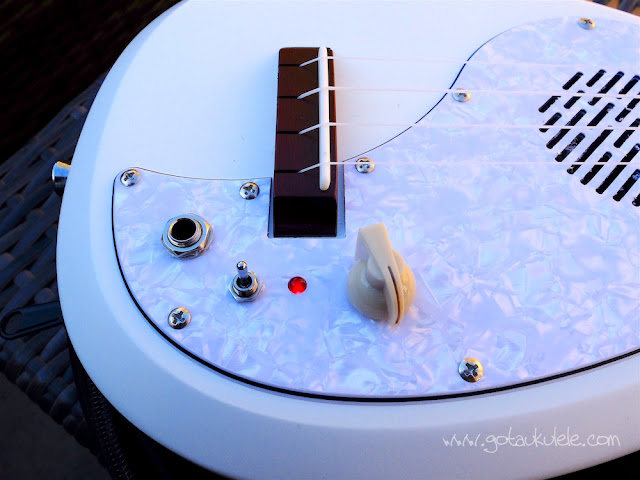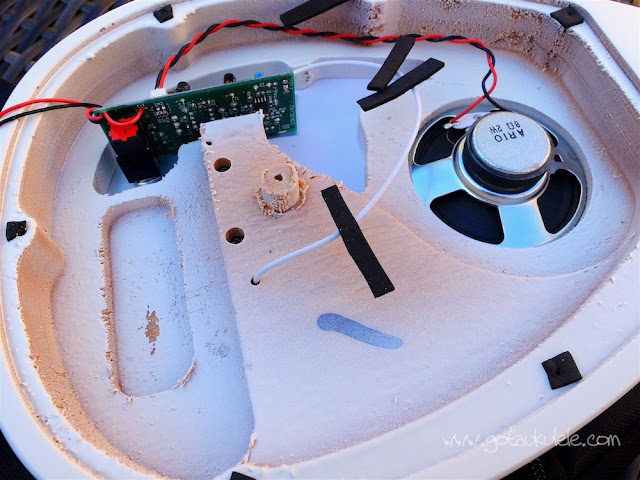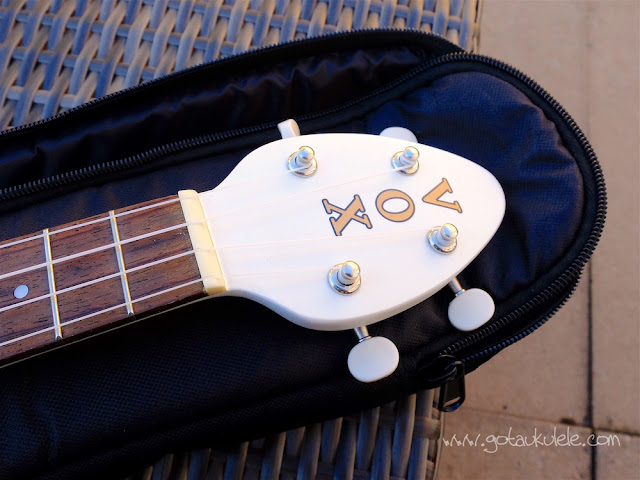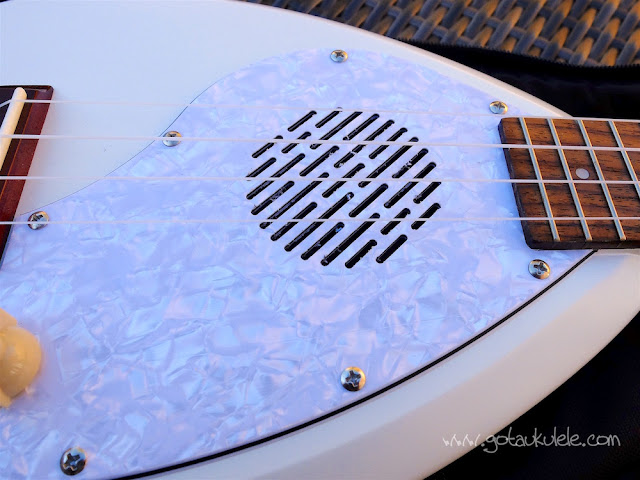I suspect that this may be another review that raises eyebrows with some. There we go. Time to look at the Vox Ukelelectric 33 series concert ukulele!
Let me say a couple of things from the off. I said in my review of the Les Paul ukulele that I was not a fan of ukes that are built to look like electric guitars. I still hold that view, but if ever there was a model to make me change my mind, it would be this Vox. I mean.. just look at it! (probably because I am such a fan of the original Vox electric guitars, and it just looks... so... damn different!). Second, these cost around £150, but being late to the party I am advised that Vox have discontinued them now. There are still some in dealers for sale, but I don't think there will me any more. No matter, there is still the used market so I hope that this review comes in handy for that.
So what we have here is a concert scale electro ukulele branded with the Vox name. If you think that these are handcrafted by Vox in Kent, you would be wrong. Of course, these are made in China and have the Vox logo slapped on them. Still, they are modelled on a classic teardrop shape guitar and something about it screams Vox idiosyncrasy. Technically, it is a solid body and not an acoustic, but it does have an unusual trick up its sleeve in the form of an onboard amplifier and speaker. More on that later.
The Vox Ukulelectric comes in a range of colours, including white (like this one), a couple of browns (one being a sunburst) and a harder to find red colour. It's concert scale, though I did read rumours that they had made a tenor. Saying that, I have never seen one for sale on these shores, so the concert it is.
The body is made from an unspecified hardwood and covered in a satin flat white finish which is quite satisfying to both look at and touch. That teardrop shape is improved upon with a chamfered edge around the top which both looks good and adds to comfort on the strumming arm when in play.
On the top, we have a white pearloid pick guard that covers both the speaker and runs down behind the jack socket and controls. It's held in place with cross head screws and has a black edging that looks quite nice. The grille for the speaker is messy as you like with lots of shavings of plastic residue still hanging off it from the cutting process.
Controls wise we have a standard ¼ jack input, a toggle on/off switch, an indicator light and a chicken head volume control. There are no tone controls at all.
The bridge is an unspecified hardwood in a slotted style (nice easy string changes) with an uncompensated plastic saddle.
On the butt of the instrument is a strap button and flipping it over and we see a hunk of black plastic covering the back and housing the access door for a 9v battery. Surely the back panel could have been smaller? It was also covered in that protective plastic for shipping that you are suppose to peel off. I say 'supposed to' as this stuff was sticky and a pain to remove without leaving traces. Perhaps it was meant to stay, but it looked dull, scratched and pretty horrible really.
Intrigued, I took the screws out of the back to see what we have inside and boy is it messy. The cavity is routed straight into the wood and about as rough as you can imagine. We have a simple circuit board that is connected on one side to the 9v battery and on the other to a cheap looking 2W speaker. I'd certainly have preferred a passive set up myself, but with the inbuilt speaker there needed to be some sort of active system in place.
At the top of the back we have a second strap button and then we move on to the neck, the back of which is finished in the same flat white as the body. The neck feels nice in the hand and is topped with a neat rosewood fingerboard. We have 16 nickel silver frets with 12 to the body. They are on the fat side (if that matters to you) and the fret edges are quite sharp on this example. Position markers are inlaid in the form of pearloid dots at the 3rd, 5th, 7th, 10th 12th and 15th with the 10th being a double spot. I've never seen the need for a position marker at the 3rd on a ukulele but there you go! Thankfully these are repeated on the side of the neck too. Nut width is fairly average, but I did find the profile assisted with comfort.
Past the plastic nut we have the teardrop shaped headstock emblazoned with the Vox logo in gold screen print. Tuning is provided by unbranded open geared tuners with white plastic buttons. Sadly the angles these are set look odd, and that is not helped by one of them not being quite in line with the others either. They work reasonably well I suppose, but the tuner for the first string is noticeably stiffer than all the others. They scream 'cheap' I guess.
Completing the deal are Aquila strings and a padded and branded gig bag which is actually of reasonably good quality. The instrument certainly looks like nothing else and on the whole is reasonably well put together. But how does it play?
Well first of all, let us just say that acoustically there is little point in me writing much more. It is not acoustic at all and makes very little sound unless amplified. At best you might get away with it in the quietest of bedrooms, but really, this ukulele is about being powered.
What I will say though is that it feels nice in the hands. It's on the heavy side, but that is to be expected with a body which is basically a hunk of wood. The setup at both the saddle and nut are perfectly acceptable. There don't seem to be any fatal build flaws that I can spot. It feels nice to play and the neck is extremely comfortable apart from the sharp fret ends.
Powered, there are a couple of choices. First off, you can avoid plugging this in to an amplifier altogether and just hit the on off toggle switch and go. The internal gubbins power the small speaker and in amplifies itself. It's a neat idea, but I can't help feeling that it could have been implemented better. First of all, the volume. Well what volume? Even with a fresh battery you really have to have this turned up full to make any noticeable sound that could even begin to compete with others in a ukulele group or band. At 50% volume or less, it might as well be switched off. At full volume it is quieter than most acoustic instruments I have played. So that leads me to think 'what's the point'. For me it is pure novelty.
Tone wise the in built speaker is a bit of let down also, with an almost overdriven sound when turned up and a quite harsh one at that. It's muddy and felt me feeling flat. Very much a piezo sound and an instrument that is crying out for some tone controls on board.
Plugged in to an amplifier and things are improved. The pickup sounds far nicer to me than, say, the strip used by Epiphone on the Les Paul. For a start, the volume across the strings is even... Something that is often a failing of pre-installed systems. Sure, it's not a high end pickup and it sounds very 'electric' but there is enough room on the output to tweak it and improve it with the simplest EQ. Even plugging it in to a basic Roland Mobile Cube and playing with the simple tone control improved it. With effects it is a hoot to play, and that may be where the instrument best shines. Classic pure tone is not what this is about.
One other gripe though that I think is worth mentioning. On a normal electric ukulele that uses a 9v battery, if you leave a jack lead plugged in to it, you will drain the battery. Unplug the lead and the battery is cut off. Makes sense right? With the Vox though, when you unplug the cable it reverts to the on board amplifier so it remains 'on' even when unplugged unless you hit the toggle switch. Why is that a problem Baz? Just turn it off? Well. I found that toggle switch is easy to knock and engage with the slightest movement. In fact on the first day I got this I inadvertently hit the switch putting it back in the gig bag. The next morning the battery was dead. A simple solution would be a switch that is harder to catch by mistake. Actually, a better solution for me would be for Vox to just have made a solid electric and avoided the on board amplifier altogether!
So mixed feelings on this on. It could have been something interesting. The shape is enough to sway me away from my 'ukes that look like guitar' phobia, and plugged in it's quite a nice instrument. Shame it is let down by that on board speaker that promises much but delivers very little. And for £150, I can't help thinking that it is somewhat overpriced for what it is. Perhaps a more stripped down version with a passive pickup would have done the trick whilst still keeping the looks?
Be sure to check out my other ukulele reviews here!
UKULELE PROS
Looks
Feel of the neck profile
Half decent solid electric pickup
UKULELE CONS
Pointless onboard speaker
Too easy to turn on accidentally
Scruffy interior finish
Sharp fret edges
UKULELE SCORES
Looks - 8 out of 10
Fit and Finish - 7 out of 10
Sound - 7 out of 10
Value For Money 7 out of 10
OVERALL UKULELE SCORE - 7.3 out of 10
UKULELE VIDEO REVIEW
© Barry Maz












Seeing that the access through the back is so easy, and given that the pickup itself is decent, I wondered if it would be a big deal to replace the active circuit and perhaps even the speaker with something slightly better, out of a micro-amp fe.
ReplyDeleteLeaving out the onboard speaker would be a no-go, since that's the selling point of this instrument, along with the retro stylings.
I think it would be easy enough - but then I would actually ditch the onboard speaker - it's just so pointless!
ReplyDeleteAgree 100% with your review, Baz. I bought a B-stock Vox last year for £105, which I thought worth a punt. I was looking for something a) cool and b) with a tad more volume to help lead a big uke jam, without lugging an amp around.
ReplyDeleteThe strings weren't at all balanced, and it took a lot.of work to get half decent. The inbuilt amp & speaker volume was very disappointing. Dunno why, coz it's rated at 2W, and my little Honeytone amp whacks it out at that rating.
Considered tweaking the electrics with a new amp & speaker, but just couldn't be bothered.
Sold it on eBay for £104.
Looked cute though, and my Brian Jones impersonation was a wonder to behold.
I've had one of these for a while and agree with most of your review, the problem I have, apart from the lack of volume, is the headstock shape!
ReplyDeleteWhen playing at the nut end I find the 'Teardrop' gets in the way?
This could have been resolved by having maybe an extra inch of neck before the headstock?
Would be interested in finding out if anyone has upgraded the electrics/speaker on this though?
Thanks for the review. I'm usually a sucker for oddball instruments, but I think I'll pass on this one.
ReplyDelete